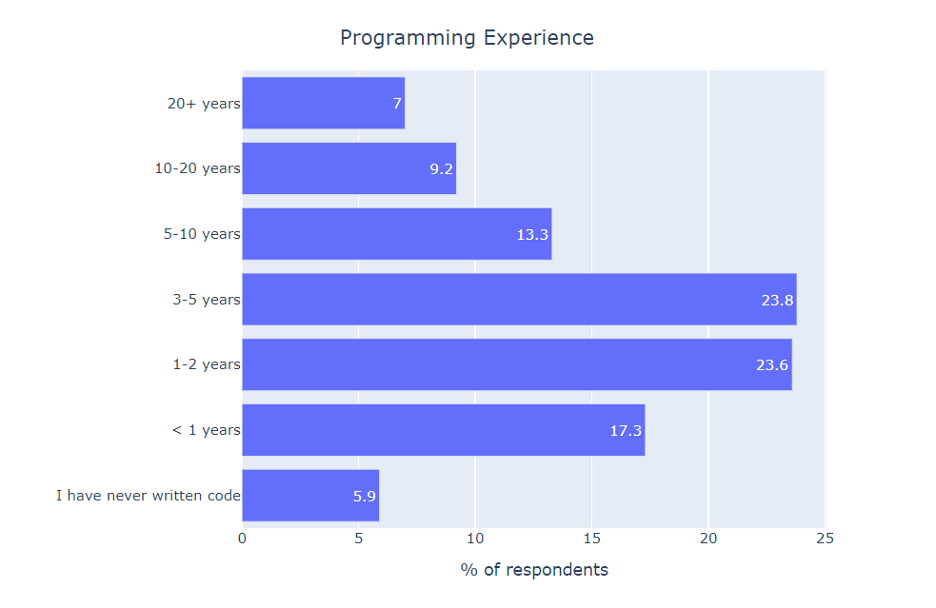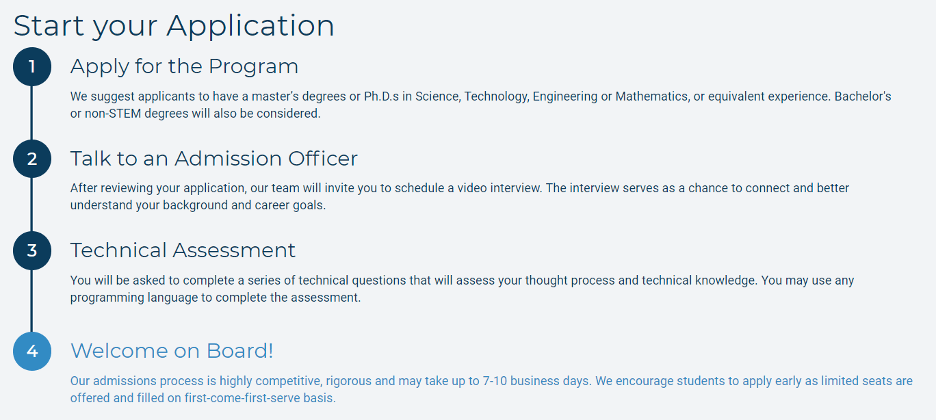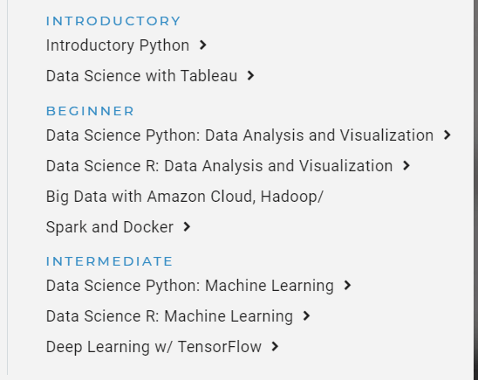Your 12-Point Guide on How to Become a Data Scientist
You Can Become a Data Scientist in 12 Weeks
Data scientists need a unique blend of skills in statistics and programming because they work on the cusp of both fields.
How To Get a Job in Data Science as a Data Scientist
Data Science Knowledge Requirements
Most start with a degree in mathematics, engineering, or computer science, then build experience in SQL, Python, and R skills before applying for internships and jobs. For a career-oriented data scientist, data science bootcamps can accelerate the journey to becoming a successful data scientist with hands-on relevant data science projects and career services.
Companies have more data than ever and collect more every day, but that’s the easy part. Data can create major issues if a company doesn’t have enough data scientists to manage, organize, protect, and interpret it. That's why when it comes leveraging data science, data scientist are critical members of the analytics team.
Nearly half of companies struggle to use their data effectively because they lack the skillset data scientists bring to the table. This shortage means current data scientists must spend all their time on only the most critical data management tasks, holding back other departments and machine learning development.
Data scientists need expert experience in Python, R, Hadoop, machine learning, calculus, algebra, data visualization, and more, along with soft skills in communication and teamwork – a tough combination to find in today’s job market.
Companies can’t find enough skilled data scientists to fill the gap. That’s why the BLS expects operations research analyst jobs to grow an impressive 25% over the next decade, making data scientist jobs some of the fastest-growing in any industry.
“Data scientist roles are projected to grow 25% by 2029 because companies in all industries struggle to fill open positions.”
Now’s the perfect time for anyone with the right background to learn how to become a data scientist. Below is a comprehensive guide covering key points along the main journey to becoming a data scientist like:
- What it takes to be a good data scientist
- Data scientist salaries and benefits
- Vital data scientist skills to land jobs at top companies
- Length of time it takes to become a data scientist
- How to find great data scientist jobs
- Tools and skillsets data scientists use regularly
- How data scientist bootcamps work
- Useful online data science courses
Jump in below to learn the step-by-step path to becoming a data scientist.
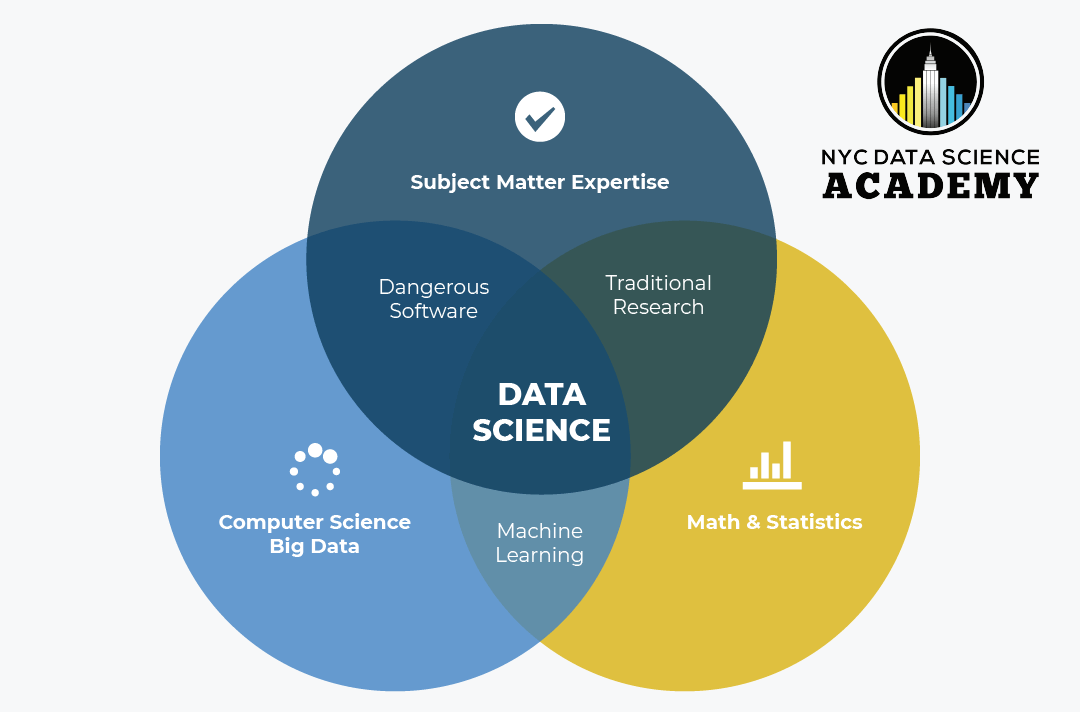
How to Become a Data Scientist
- Evaluate your education and skills.
- Master Python, R programming, and statistics.
- Enroll in a bootcamp to apply the skills with industry tools.
- Complete relevant projects for experience.
- Connect with industry companies for mentorships, projects, and internships.
Data Scientist Roadmap
A Step-by-Step Infographic
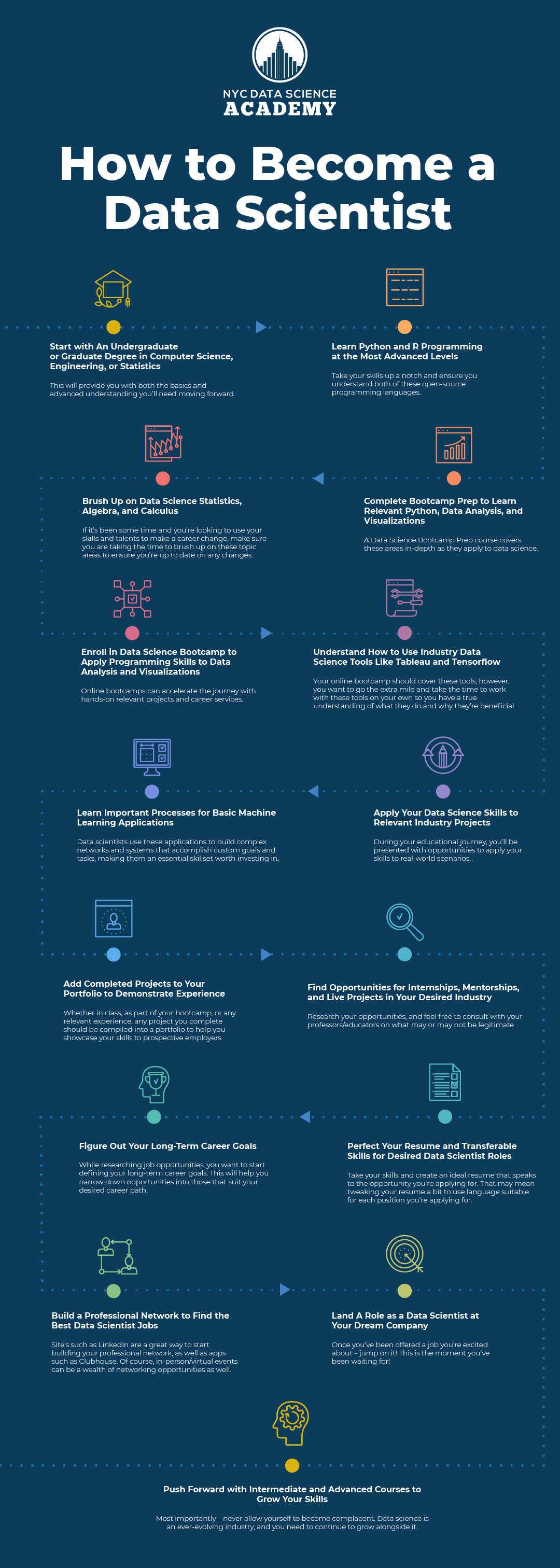
1. Who Should Learn How to Become a Data Scientist?
Data science is a challenging field, and requires practical skills and experience in statistics, algebra and calculus to perform successfully. While someone with a degree in either mathematics, engineering or computer science may have many of the prerequisite skills, many other degrees can and do confer the requisite skills, including but not limited to, degrees in economics, biology, chemistry and psychology.
So although it is possible to become a data scientist without a degree, great data scientists also need to know how to explain their complex work to non-experts effectively. This translates into having advanced communication skills coupled with emotional intelligence. So the answer is yes to the question: Can i be a data scientist without a degree? But it will be a little more challenging.
Data Scientists Live Between Software Engineering and Statistics
Data scientists fill a unique role on the cusp of these two main disciplines.
A data scientist needs enough knowledge in math and statistics to analyze massive datasets, figure out what matters, and transform them into easy-to-understand data visualizations.
Data scientists also need solid programming experience in Python and R to manipulate files, manage data infrastructure, and prepare datasets for machine learning.
The emphasis on programming sets data scientists apart from data analysts. It’s the advanced programming that allows data scientists to make data-driven predictions and/or work with machine learning development.
Which are the Best Degree(s) for Data Scientist?
Due to the field’s technical nature, most data scientists start their career with a bachelor’s degree or master’s degree in statistics, mathematics, engineering, or computer science.
Understand the Gravity and Importance of Data Scientist Roles
Data scientists enjoy some of the highest salaries at most companies. Be prepared for equally high expectations.
Companies know that effective data science is key to staying competitive today and surviving tomorrow. Accurate predictive analytics and business intelligence will soon guide nearly all decisions pertaining to:
- Marketing
- Lead generation
- Sales
- Budgets
- PR
- Crisis preparation
- Internal relations
- Supply chain logistics
- Innovation
Remember, most companies are already behind in their data science capabilities. With so much riding on each task, it’s easy to see why companies need data scientists invested in the outcome of their work and ready for anything.
The Best Data Scientists Have the Right Interpersonal Skills
Data scientists deal with some of the world’s most complex and advanced processes every day – but their work doesn’t exist in a vacuum. Companies hire data scientists to help other departments make sense of the data’s predictions to inform their day-to-day work.
The best data scientists know their work is intimidating to most people. They have the interpersonal skills to explain complex processes and possibilities in a way everyone can understand.
Companies also need data scientists who understand how their work fits into team operations. While advanced, data science alone can’t dictate operations: Company stakeholders and department heads need data scientists to offer a range of possibilities to decide which path to take.
A little charisma or personability helps make data science interesting during company presentations and goes a long way in job interviews.
2. Average Data Scientist Salary Range + Benefits
The median wage for a data scientist in the US is $85k per year, with entry-level roles starting around $60k and top positions paying $141k or much higher. Data scientists with key skills often earn 25% to 40% above the average base salary.
Companies Battle with Benefits for the Best
With so many open positions and so few data scientists available, companies usually offer the best benefit packages to attract data scientists.
Aside from basic benefits like healthcare and paid time off, data scientists may also enjoy:
|
Parental leave |
Adoption assistance |
Stock options |
|
Pet insurance |
Referral programs |
Computer assistance |
|
Tuition reimbursement |
Flexible schedules |
Gym memberships |
Are Data Scientists Happy?
Plenty of Career Development Opportunities
It’s hard enough to find candidates with the right combination of statistics and programming experience, much less cutting-edge technical skills.
Data science offers plenty of career development opportunities after learning the basic requirements through a bootcamp.
An extra skill or two can boost a data scientist’s earning potential and even put them ahead of other applicants, offering plenty of opportunities for career advancement after completing a Data Scientist Bootcamp. Companies are willing to pay well beyond the average base salary if a data scientist has experience in:
|
Cloud architecture |
DevOps |
CI/CD |
|
Microservices |
Performance marketing |
Martech |
|
5G |
Distributed systems |
Leadership |
Leadership experience is especially useful for landing a high-level data scientist role or demonstrating long-term value to potential employers.
Top Companies Pay Top Data Scientist Salaries
Tech giants like Facebook, Google, and Apple lead the way in machine learning and artificial intelligence. They also need data scientists to help them chart the course, and they’re happy to pay $180k or higher in some cases – 51% above the national average.
Data scientists at companies like Airbnb, Twitter, and eBay often earn salaries in the $170k range. Meanwhile, big-box stores like Target also need experienced data scientists and pay in the $150k range.
As more companies move forward with their digital transformation and embrace predictive analytics, expect more roles to open up for data science positions offering attractive salaries. Remember, the BLS expects overall computer information and research jobs to grow 15% before 2030 – and who knows how much beyond then.
Certain Industries Need Only the Best
Some of the highest data scientist salaries are in finance, with some companies paying $186k per year on average.
Companies in highly innovative industries like healthcare need the best data scientists, especially for leadership roles or research and development positions.
Meanwhile, companies in industries like manufacturing and retail need experienced data scientists to predict and plan things like supply chain logistics, crisis management, and factory or distribution automation.
|
Industries with High Demand for Data Scientists |
||
|
Tech & AI |
Retail |
Manufacturing |
|
Finance |
Professional services |
Healthcare |
3. What Skills are Needed to be a Data Scientist?
Companies struggle to find qualified data scientists due to the unique skillset spanning technical programming and statistical analysis. Data scientists need extensive experience in Python, R, Hadoop, machine learning, calculus, algebra, data visualization, and more, along with soft skills in communication and teamwork.
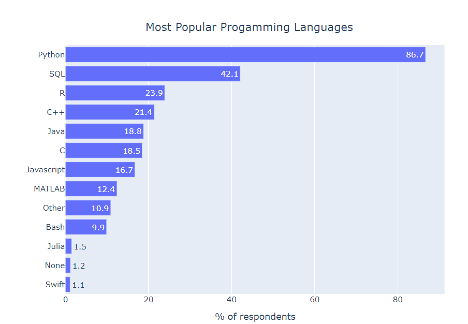
Source: Kaggle
Technical Skills Data Scientists Need
Data scientists need a strong technical background in computer science and software engineering as well as math and statistics.
Data scientists work with massive data sets at a high level and use their programming experience to draw insights and predictions.
Day-to-day demands involve complex tasks designing algorithms, wrangling data, designing data infrastructure, and more depending on the job.
Many data scientist find they need these basic technical skills:
|
Python |
R programming |
Hadoop |
SQL |
|
Apache Spark |
Machine learning & AI |
Data visualization |
Unstructured data |
|
Statistics |
Probability |
Software engineering |
Data manipulation |
Soft Skills Data Scientists Need
Data scientists should also bring a range of useful transferable soft skills to the table. In such a technical field, it’s important to feel comfortable explaining complex topics and insights in a manner everyone at a company can understand.
It’s also helpful for data scientists to keep the broader business picture in mind as they work and produce results to avoid getting lost in the details (which is easy to do given the technical nature of data science work).
Data scientists should also understand general business operations in the industry they intend to work. One data science department often provides insights to departments and stakeholders across the company.
|
Important Soft Skills for Data Scientists |
||
|
Curiosity |
Industry knowledge |
Business operations |
|
Data storytelling |
Patience |
Teamwork |
Additional Skills Certain Data Scientist Roles May Require
Companies often need data scientists with experience in specific skills – some directly relate to data science, and others don’t.
Meanwhile, data scientists looking to grow with a company should consider leadership skills or relevant industry skills that cross into data science needs.
|
Useful Skills for Data Scientists in Certain Industries |
|||
|
Cloud architecture |
Sales |
Martech |
Business management |
|
Project management |
Risk management |
Supply chain logistics |
Healthcare |
4. What Education or Qualifications Do You Need to Become a Data Scientist?
Most data scientists begin their career with a master’s degree or Ph.D. in either statistics or computer science. However, 25% also start the journey with undergraduate degrees in math, engineering, computer science or statistics and focus on building their programming experience. Others start their journey to becoming a data scientist with a degree in economics, biology, chemistry, psychology and other humanities disciplines. A few data scientists hold an associate degree or less, but this is rare.
Career-ready data scientists – regardless of their degree – must also prove they can apply the right programming skills to data. Bootcamps with internships, hands-on projects, and portfolios can meet this need and open career doors.
Education and Degrees Data Scientists Need
95% of data scientists have at least a bachelor’s degree. However, 75% hold more advanced degrees: 55% have a master’s degree while 20% hold a Ph.D.
The advanced knowledge of statistical analysis needed to make sense of data and apply programming makes it hard for non-degree holders to get in the data science door.
However, it’s not impossible. 5% of data scientists say they only have an associate’s degree or high school diploma. Expert programmers with the right skills could fill the gap with the right calculus, algebra, and statistics courses.
Portfolios and Relevant Experience
Every data scientist needs to show companies they can deliver results and complete the job’s demands. With companies paying an avera $98k/year on average across the United States, data scientists need to build portfolios to prove their industry value.
Plus, it’s important to remember that 20% of data scientists hold a Ph.D., which implies they entered the field with years of research and project experience. Others will need a similar portfolio to compete in the job market.
How do data scientists prove experience?
- Bootcamps: Learn the right Python, R programming, and other technical skills as they relate to the career’s demands, complete hands-on projects that mimic the work, and build a portfolio to pitch to companies. Some bootcamps also offer career placement services.
- D. research: Data science PhDs might conduct research projects in specific industries they intend to work.
- Internships: Data scientists can prove they’re worth the money by adding relevant internships to their portfolio.
- Projects: Relevant self-guided and group projects can show employers that a data scientist can work as part of a team and independently to deliver results.
5. How to Become a Data Scientist Without a Degree
Can You Become a Data Scientist Without a Degree?
A full 5% of data scientists say they don’t have a bachelor’s degree so entering the career through this route is challenging, although not impossible for the right people. Anyone without a degree will need to prove they have the knowledge and skills a data science career demands. Some routes include:
- Data engineer: 25% in this field have an associate degree or high school diploma. The data, statistics, and programming could serve as a foundation for exploring data science.
- Software engineer/developer: Those with advanced programming experience – especially Python – could complete relevant statistics courses to fill the gap.
Programming and data engineering jobs offer the best chances for non-degree holders to build enough knowledge and experience to compete in the data science job market.
Anyone trying to enter the field from this angle will need to learn relevant programming and statistics pertaining to data science and build a portfolio.
What's the Best Way to Become a Data Scientist?
Data Scientist Bootcamps Are a Great Option!
Data science bootcamps are intensive and highly technical, so non-degree holders should make sure they have the relevant experience to keep up. However, those trying to enter data science from either data engineering or software development backgrounds could benefit from a bootcamp.
A Data Science Bootcamp Prep course covers Python, data analysis, R programming, and data visualization as they apply to data science, making it a smart choice.
Become a Data Scientist in 12 Weeks
Later, the Data Science Bootcamp digs deeper into the details of everything covered in prep and provides hands-on projects to put the concepts and skills into action via an intensive 12-week course.
6. How Long Does It Take to Become a Data Scientist?
It can take anywhere from five to ten years or more to learn all the appropriate skills and build the hands-on experience necessary to become a data scientist. Data scientists need to learn two of the field’s main disciplines – programming and statistics – at an expert level, which takes considerable time to master.
Source: Kaggle
The Fastest Paths to Becoming a Data Scientist
Here’s how the path to becoming a data scientist breaks down into components:
|
Degree |
Supplemental |
Experience |
|
4 to 8 years |
1 to 5 years |
Varies |
|
Earn a bachelor's, masters, or Ph.D. in computer science or statistics |
Learn relevant programming or statistics not covered during degree work |
Build portfolio through bootcamps, projects, internships, etc. |
- Path One
Someone earning a bachelor’s in mathematics with a heavy concentration in statistics will need to dive into programming courses as soon as they receive their degree. Meanwhile, anyone with an undergraduate degree in computer science will need a deeper understanding of statistics, algebra, and calculus to apply their programming skills. - Path Two
Bachelor holders with programming knowledge could jump into Data Science Bootcamp Prep to earn the experience and practical skills in the shortest time. - Path Three
Those starting with a master’s degree should consider their comfort with programming and statistics to close any gaps before signing up for Data Science Bootcamp Prep. - Path Four
PhDs, depending on the concentration, may go straight into Career Development Bootcamps or Bootcamp Prep.
It depends on the career and related experience. Software engineers, software programmers, and data engineers are in the best positions to enter data science after several years in their respective industries.
Anyone thinking about entering data science from these industries should examine the demands of the Data Science Bootcamp Prep to make sure they’re prepared to handle the intensive technical work.
7. How and Where to Find Great Data Scientist Jobs
Running a search on job board websites will deliver tons of data scientist jobs – mostly entry-level positions – in every industry across the country and beyond. However, smart data scientists take a comprehensive approach to finding jobs: LinkedIn connections, conferences and events, internships, live projects, and bootcamps with career services.
Job Boards Aren’t Enough
Most data scientist jobs pay over $100k a year, so companies expect to see a return on their investment. Posting high-value positions on public job boards increase a company’s risk of receiving applications with fraudulent experience, references, or education.
Plus, data science is still an emerging industry, and many companies don’t know how to vet applicants and their backgrounds properly.
Instead, it’s easier for businesses to rely on other routes where someone who understands data science can point qualified applicants in their direction:
- Employee referrals
- Internships
- College career placement programs
- Professional organizations
- Bootcamp career services
The Best Approach to Finding Data Scientist Jobs
Data scientists should also take a comprehensive approach to find jobs. A well-rounded network can build someone’s reputation as a respectable data scientist and tap them into the right industry connections:
- Building a LinkedIn network of fellow data scientists and professionals in the industry someone intends to work.
- Attending data science and general industry conferences to actively engage others working in the field.
- Participating in internships, hackathons, sponsored projects, and contests at various companies.
- Becoming a member of relevant professional organizations and associations as well as industry associations.
- Completing a Data Science Bootcamp with industry partnerships, internships, and career services.
Businesses like partnering with Data Science Bootcamps because instead of vetting individual applicants, the company can just vet the bootcamp itself. They’ll know that each data scientist who completes the bootcamp program and enters the career system is prepared to meet the company’s demands.
8. Must-Have Data Science Tools and Skillsets
Can You Be a Data Scientist Without Coding?
Data scientists are nothing without their tool chest. Speedy processors and hardware are just the beginning. A data scientist needs to clean, manipulate, and visualize their data using various tools depending on the task.
Every data scientist's data science toolkit must include mastery of Python and R for use across data visualization and analysis tools. The Main tools Data Scientists use fall into four main categories:
|
Storage & Cleaning |
Transformation |
Modeling |
Visualization |
Several tools fall under each category depending on the industry, type of visualization needed, what a data scientist needs to accomplish, and who will use the finished product.
Start with the Basics
Once a data scientist learns the data science fundamentals and master the most important tools, they can expand their expertise to more niche options specific to their industry.
Every data scientist should understand how to use these tools inside and out:
- Tableau
- Amazon Cloud
- Hadoop
- Docker
- Spark
Most start with Tableau as an introduction before moving onto Amazon Cloud and the others.
Tableau is interactive, which makes it user-friendly for beginner data scientists. They can focus on processing and manipulating data instead of dealing with the software learning curve.
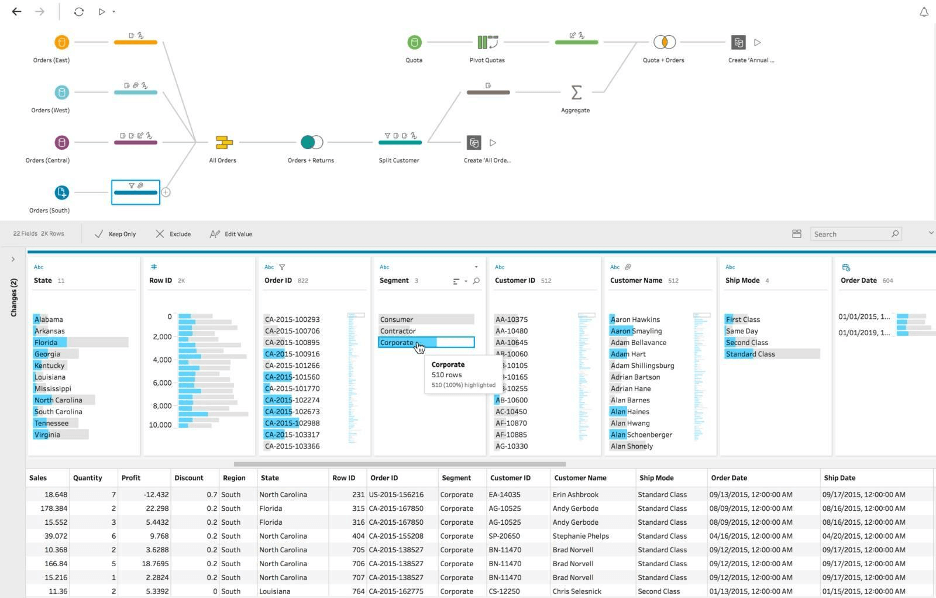
Advanced Machine Learning Tools
Once a data scientist solidifies their grasp of basic tools, they can move onto more advanced tools for machine learning applications like TensorFlow.
Data scientists use TensorFlow to build complex networks and systems that accomplish custom goals and tasks such as:
- Neural networks
- Recommender systems
- Generative adversarial networks
For example, Airbnb uses TensorFlow to categorize listing photos. Meanwhile, doctors and healthcare systems use TensorFlow to build disease-detecting systems.
This chart explains how a data scientist in machine learning might use TensorFlow from loading data to deployment:
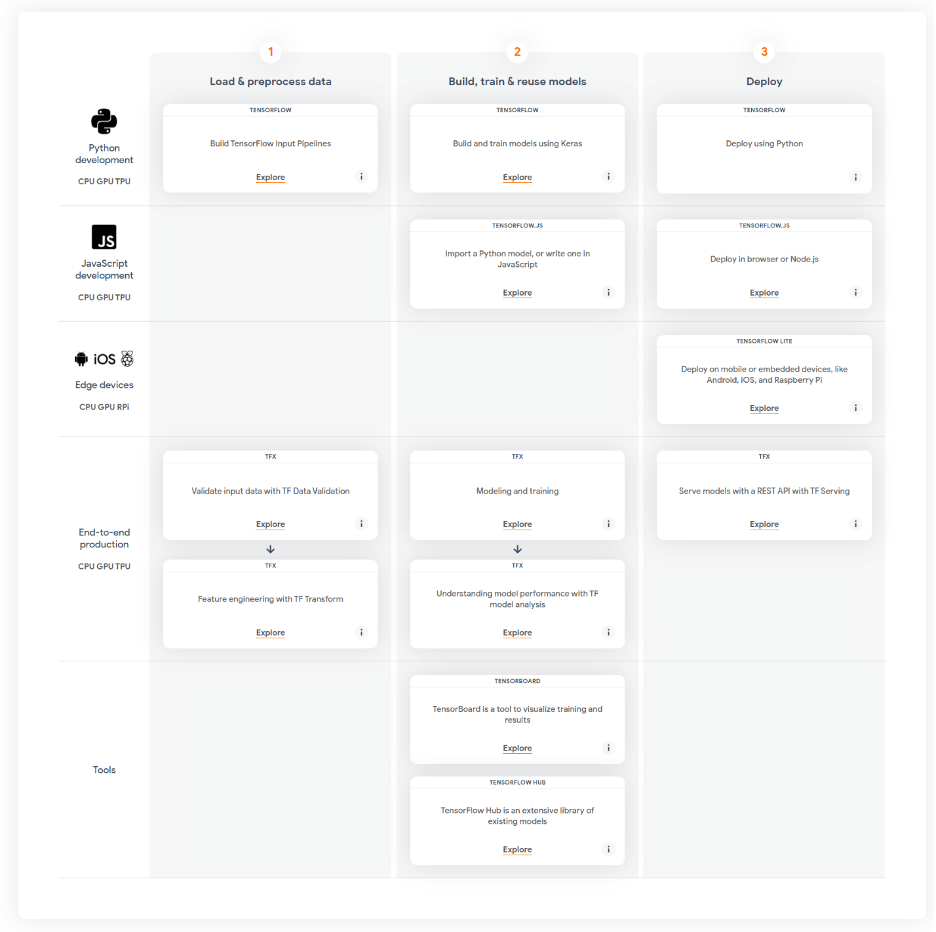
9. Can You Learn Data Science Online?
Absolutely! Depending on your career path, data science is one of the few fields where you can reach the highest levels of education and expertise entirely online. One of the major advantages of a bootcamp with interactive distance learning is that it is synchronous in nature and affords flexibility for those who wish to study while holding on to a part-time or full-time job.
How to Become a Data Scientist Online
Here’s how to become a data scientist online from undergraduate degree to experience:
- Earn an undergraduate and/or graduate degree in computer science or math.
- Master Python programming.
- Learn statistics, algebra, and calculus.
- Enroll in a Data Scientist Bootcamp for relevant industry project experience.
- Intern at companies in a chosen industry.
How to Become a Data Scientist with an Online Degree Program
Someone learning how to become a data scientist will start their journey with a bachelor’s degree in computer science, engineering, or mathematics from an accredited university.
Most universities and many community colleges offer 100% online computer science programs. Computer science is often the first complete degree program colleges offer fully online.
From there, a student may go for a graduate degree to hone their education in statistics and/or programming.
Regardless of degree, every student will need to master Python and data science programming before moving on to the next step. Meanwhile, computer science majors who know Python will still need advanced statistics knowledge – specifically algebra and calculus.
Gain Hands-on Experience that Pertains to Industry Work
Education can only prepare a student so much for the complexities of data science job roles. That’s why hands-on relevant experience is vital.
Data Scientist Bootcamp programs can bridge the gap between statistics and programming through relevant coursework, projects, and specialties. Bootcamps are designed to prepare future data scientists for the industry’s specific demands and build their portfolios.
A Ph.D. student of data science may spend their time building experience through research projects – ideally in their chosen industry.
However, even PhDs may not learn specific tools and processes that industry roles demand, and a Bootcamp can fill the gap. PhDs can benefit from the career services and networking of a Data Scientist Bootcamp as well.
10. Are Data Science Bootcamps Worth It?
Which Big Data Scientist Skills Does a Bootcamp Need to Equip You With?
A data science bootcamp is only worth the money if it provides hands-on experience, projects, and coursework to fulfill required job demands. If it doesn’t train students to apply Python and R programming to data for manipulation, analysis, and machine learning, it’s probably not worth it.
A Data Science Bootcamp Should Blend Programming and Data Analysis
If a bootcamp covers programming or data analysis individually but doesn’t outline training projects for merging the two fields, it’s not data science.
If a bootcamp covers programming or data analysis individually but doesn’t outline training projects for merging the two fields, it’s not data science.
A bootcamp should clearly explain how to become a data scientist with a transparent and detailed program that covers:
- How to apply R and Python to data analysis and visualizations
- How to apply R and Python to machine learning processes
- Processes used in real industry job situations
- Hands-on projects to build a work portfolio
- Advanced techniques like Deep Learning or Big Data
- Relevant industry tools like Tableau, Hadoop, and TensorFlow
Legitimate data science bootcamps also offer networking, career services, and internship opportunities because they stand behind their programs.
Ideally, a data science bootcamp should partner with companies to supply hands-on projects and internships for students to cite as relevant experience or use as a career pipeline.
Data Science Bootcamps Shouldn’t Accept Everyone
Data science blends the most advanced programming processes and statistics. High-quality data science bootcamps are intensive, requiring an adequate background in Python programming and statistics.
If a bootcamp accepts everyone without asking questions about programming experience or understanding of statistics, it probably isn’t worth it.
Legitimate data science bootcamp know their programs are intensive. These bootcamp will assess applicants to ensure they’re prepared to jump into the projects and coursework:
If someone falls short in Python or statistics knowledge, the bootcamp should explain what to learn before they enroll and possibly offer a bootcamp prep course just to be sure.
11. How to Choose a Data Scientist Bootcamp
It’s important to choose a data scientist bootcamp transparent about prerequisite skills and experience, skills students will learn at each course level, data science processes and how the training applies to actual jobs in data science.
A bootcamp must also clearly outline training on relevant tools, processes, and projects, so applicants know whether they’ll learn how to become a data scientist or not.
Ask these questions while choosing a data scientist bootcamp:
- Does the bootcamp cover specific processes and skills needed to enter a data science job?
- Does it offer advanced training to grow in the data science field?
- Does it outline prerequisites in Python and statistics?
- Does the bootcamp partner with companies for projects, career services, mentorships, and internships?
- Is the bootcamp accredited by a recognized educational accrediting agency, such as ACCET?
Does the Bootcamp Cover Specific Processes and Tools Used in Industry Data Science Jobs?
A legitimate bootcamp assumes anyone enrolling has the Python experience and statistical analysis knowledge to jump into skills they’ll use in a data scientist job. For those lacking the appropriate skill-levels, the bootcamp should also offer professional development courses to prepare potential data scientist bootcamp applicants.
A beginner bootcamp should cover:
|
Using Python in data analysis and visualizations |
Using R in data analysis and visualizations |
Using R and Python in machine learning |
Tools like Tableau, Matplotlib, and TensorFlow |
Does the Bootcamp Also Offer Advanced Training?
Basics can only get a data scientist so far. Training opportunities shouldn’t end after bootcamp.
Students should leave bootcamp prepared to fulfill entry-level data scientist roles and take the next steps to further their career with courses on Big Data, Amazon Cloud, Machine Learning, Deep Learning with TensorFlow, and more:
Does the Bootcamp Explain Prerequisites in Programming and Statistics?
People enter data science from a wide range of educational backgrounds and industry fields.
Some have spent years mastering Python, while others have dealt with data analysis and statistics their whole career. Some enroll after receiving a bachelor’s degree, but others have already received a Ph.D.
A bootcamp should clearly explain the prerequisite skill levels needed before someone can even learn how to become a data scientist.
Does the Bootcamp Partner with Industry Companies?
Big companies across all industries need data scientists but universities are still catching up so skills in the job market just don’t match demand. A bootcamp should serve as a liaison for data science students and top companies.
Some bootcamps partner with companies to provide their student and alumni network with things like:
- Project experience at industry companies
- Relevant mentorship for certain companies or industries
- Career assistance services and internships
- Resume and interview guidance
These not only prepare but actively push students into the arms of relevant industry companies.
Here’s what bootcamp projects might look like from industry partners:
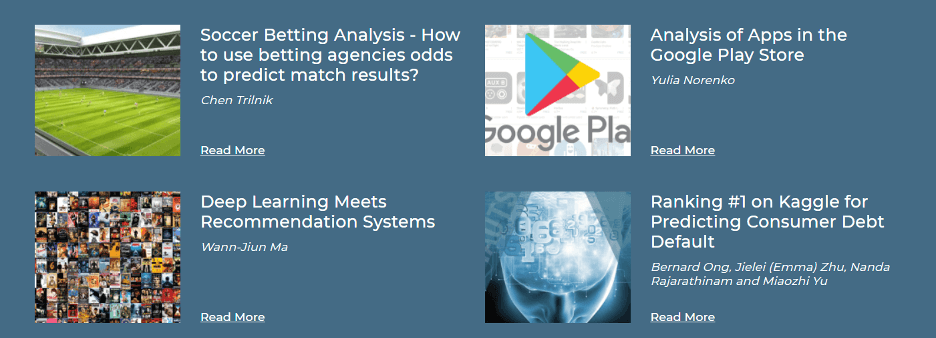
12. How to Start Your Journey to Become a Data Scientist Step-by-Step
The journey to becoming a data scientist starts by understanding how your skills align with the skills needed to work in industry job roles. From there, you can strategize what skills in data analysis or programming you’ll need to fill the gap and how to prove yourself with relevant experience.
Anyone serious about learning how to become a data scientist needs these basics:
|
Python |
R programming |
Hadoop |
SQL |
|
Apache Spark |
Machine learning & AI |
Data visualization |
Unstructured data |
|
Statistics |
Probability |
Software engineering |
Data manipulation |
Today’s data scientists enter the field from several education levels and backgrounds, providing ample career paths for data scientists with a relevant degree, whether they hold a bachelor’s or Ph.D.
Today’s data scientists enter the field from several education levels and backgrounds, providing a wide range of career paths to become a data scientist for anyone with a relevant degree, whether they hold a bachelor’s or Ph.D.
Here’s How to Become a Data Scientist Step-by-Step:
- Start with an undergraduate or graduate degree in computer science, engineering, or statistics.
- Learn Python and R programming at advanced levels.
- Brush up on statistics, linear algebra, and calculus
- Complete Bootcamp Prep to learn relevant Python, data analysis, and visualizations.
- Enroll in Data Science Bootcamp to apply programming skills to data analysis and visualizations.
- Understand how to use industry data science tools.
- Learn important processes for basic machine learning applications.
- Apply your data science skills to relevant industry projects.
- Add completed projects to your portfolio to demonstrate experience.
- Find opportunities for internships, mentorships, and live projects in your desired industry.
- Figure out your long-term career goals.
- Perfect your resume and transferable skills for desired data scientist roles.
- Build a professional network to find the best data scientist jobs.
- Land a role as a data scientist at your dream company.
- After successfully completing the NYC Data Science Bootcamp, continue to enhance your skills with further advanced training. Afterall, continuous learning is a necessity in today's market.
Data science is a versatile field because it allows you to work in nearly any industry you please. Companies in retail, finance, technology, healthcare, business management, manufacturing all need data scientists and offer a lucrative career path for data scientist.
Plus, data scientists have plenty of room to grow with leadership, machine learning, or more advanced technical skills. Even the data science field itself is still growing and advancing every day.





